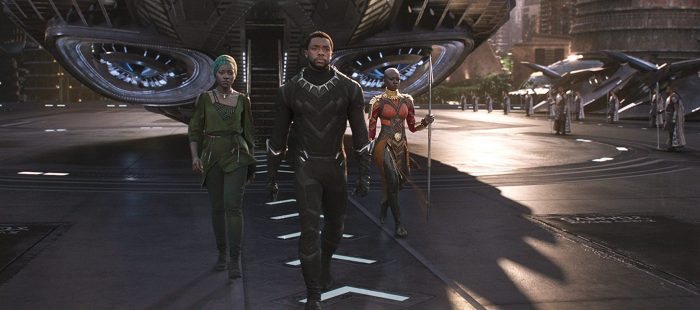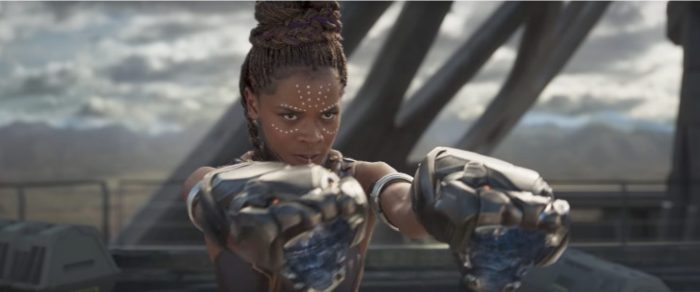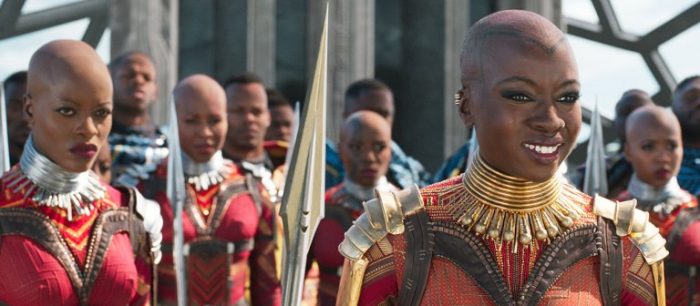‘Black Panther’ Reveals a Bright, Ambitious, and Personal Future for the Marvel Cinematic Universe
(Welcome to Road to Infinity War, a new series where we revisit the first 18 movies of the Marvel Cinematic Universe and ask “How did we get here?” In this edition: we reach our conclusion with Black Panther, a film that finds Marvel reaching its optimum.)
The final stop on the Road to Infinity War is Black Panther, a sprawling superhero epic the likes of which American cinema has never seen. It’s still cleaning house at the global box office just days before its follow-up (a nine-franchise culmination to the Marvel saga), and it’s one of the most important pieces of the Marvel puzzle. Not necessarily in terms of overall narrative – the film is relatively isolated from sixteen of its seventeen predecessors – but rather, as a potentially landscape-shifting benchmark for mainstream filmmaking.
While it’s hard to measure a film’s long-term legacy in just its third month of release, it’s safe to assume that no American film since Marvel’s own The Avengers has had this seismic an impact. Black Panther has flown past all critical and financial expectations (and then some), completing Marvel’s third act turn of stepping outside the norms of Western storytelling – as seen in Doctor Strange, Guardians of the Galaxy Vol. 2 and Thor: Ragnarok – albeit to a much more significant degree. It builds on all the tricks of Marvel movies past, dipping its toes in the familiar before transforming the visual and thematic language of the superhero movie entirely. It’s what happens when a studio places its trust in a creative team uniquely suited to the story, and it’ll probably result in other studios taking similar risks on Black filmmakers and other filmmakers of colour, redefining who gets to hold the megaphone of mainstream cinema.
The long-held executive myth that black stars can’t open big movies feels like it’s all but gone, and who knows what other myths will crumble in the years to come.
Then again, some of these changes would likely be possible even if the film were a financial success but an artistic failure. The discussion of its full industry impact will likely be abstract until substantial changes actually come into view, but the reason it feels like we’re just waiting for the cement to harden is the precision with which it was poured. The fact remains: the success and cultural importance of Black Panther is owed in large part to it being an absolute banger. It’s pop filmmaking at its finest, filtered through a potent lens that’s just been itching to be utilized.
Afrofuturism
In his 1994 essay “Black to the Future,” cultural critic Mark Dery (in conversation with several prominent African American voices in sci-fi and criticism) coined the term “Afrofuturism.” It’s a creative philosophy that prioritizes stories, themes and aesthetics drawn from African influence – as opposed to simply having them be window dressing in Western science fiction – and the design of Black Panther is steeped in it. The film feels new to most Western eyes, and to most eyes in general, because it steps outside Hollywood’s traditional depictions of African culture. It lets Black creators craft a Pan-African tapestry that speaks, first and foremost, to members of an African diaspora that may have been robbed of their languages and specific cultural origins.
This is owed in part to Marvel Studios letting director Ryan Coogler bring on creative heads familiar to him, each of whom worked their magic to bring a sense of grounded familiarity to the fantasy setting of Wakanda. Coogler was joined by several of his Creed and/or Fruitvale Station cohorts, like cinematographer Rachel Morrison (Mudbound, Dope), composer Ludwig Göransson (Survivors Remorse) and production designer Hannah Beachler (Moonlight, Lemonade), along with a who’s who of other key creatives of Coogler’s choosing, like writer Joe Robert Cole (The People vs O.J. Simpson) and legendary costume designer Ruth E. Carter (Selma, Malcolm X). That’s a lot of talent on display, and more importantly, it’s talent whose focus has been the telling of Black narratives.
In the process, Black Panther is imbued at every turn with a unique visual and aural authenticity, remixed to create something new. The costumes and accessories of Wakanda’s various factions take their cues from real African cultures, like Suri for the River Tribe and Masai for the Mining Tribe, not to mention Ruth E. Carter’s own Basotho for Border Tribe led by W’Kabi (Daniel Kaluuya). This African superpower, walled off from the effects of colonialism, saw technological innovation and African tribal art and symbolism progress as one and the same, as opposed to their usual portrayal as mutual exclusives. Apart from just the aesthetics though, Black Panther leans in to the core thematic purpose of Afrofuturism as well: exploring the world – past, present and potential future – through a lens of Blackness.
A Clash of Perspectives
Wakanda represents the best and worst of modern America. While its unfettered progress yields unapologetically Pan-African aesthetics, it stands locked in debate over the refugee crisis outside its borders. The recent change in leadership from the late King T’Chaka (John Kani, Atandwa Kani) to his son T’Challa (Chadwick Boseman) has left the kingdom in a state of mournful reflection. In Captain America: Civil War, the nation’s attempts to open up to the world led indirectly deaths of its civilians in Lagos and directly to the murder of its monarch. “The world is changing” is the mantra of several Marvel characters from T’Chaka to The Vulture (Spider-Man: Homecoming), and the various factions within Wakanda are in disagreement over how to adapt to that change.
T’Challa is at the center of these warring ideals, a character figuring out the best course of action to balance being a good man with being an effective leader. Like “Phase 3” heroes Thor (Ragnarok) and Star-Lord (Guardians Vol. 2), he’s shouldered with both a divine legacy and the lies told in order to maintain it; a rotten foundation that keeps the kingdom standing. In T’Challa’s case, the lie was T’Chaka’s murder of his own brother N’Jobu (Sterling K. Brown) and the subsequent abandonment of N’Jobu’s son Erik (Michael B. Jordan) in order to keep Wakanda a secret. While Erik eventually returns to exact vengeance, T’Challa must not only consider Erik’s outlook on Wakanda’s refusal to provide aid, but the outlook of everyone around him.
T’Challa is the central point linking all of Wakanda’s ideological conflicts, each articulated by a uniquely alluring character who comes off in the right in some form. It’s on T’Challa to decide which parts of these conflicting ideas to consider before making his decisions. His responsibility is to compromise, and that’s a tough position to be in.
Continue Reading Black Panther Revisited >>
The post ‘Black Panther’ Reveals a Bright, Ambitious, and Personal Future for the Marvel Cinematic Universe appeared first on /Film.
from /Film https://ift.tt/2KevtdZ



No comments: